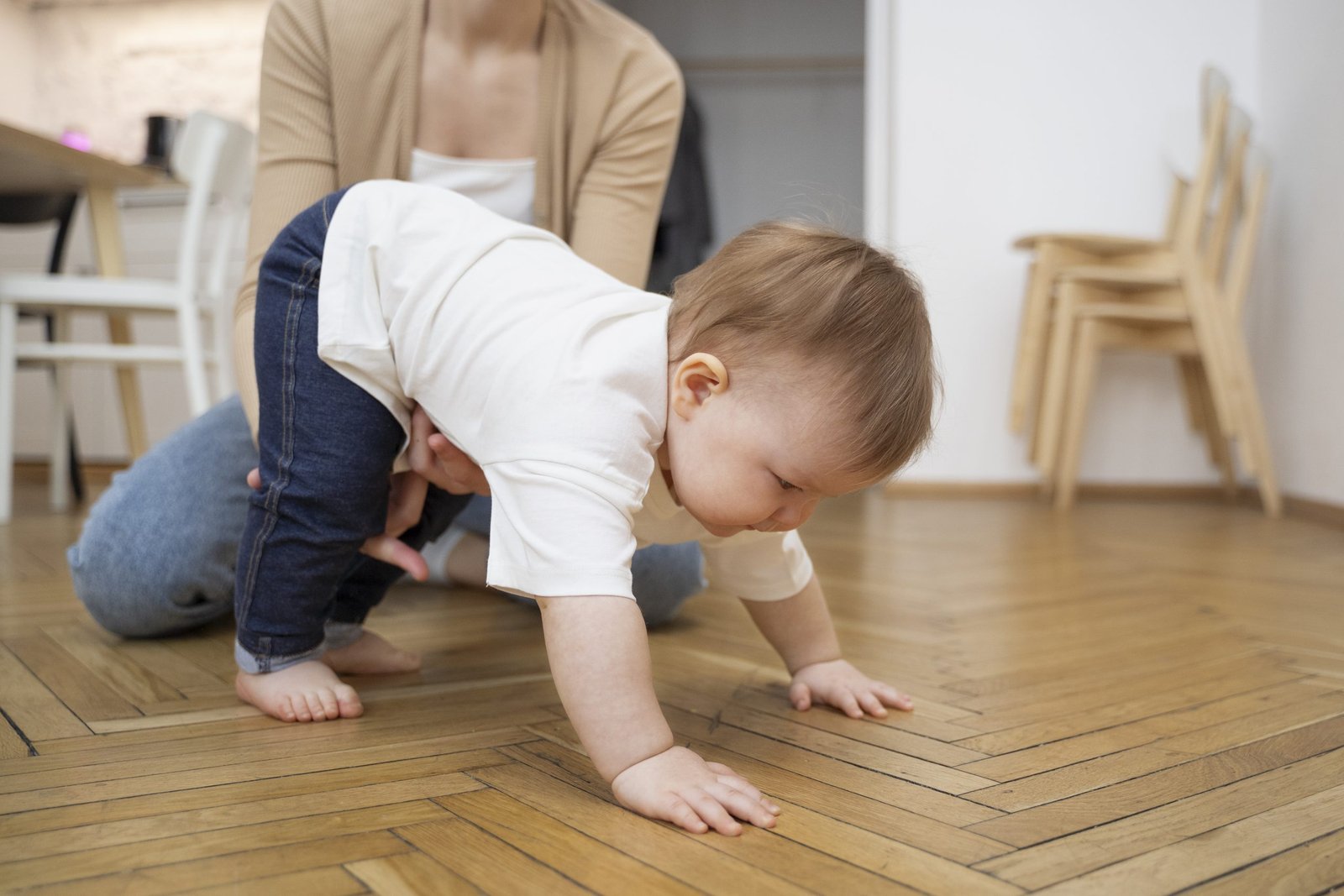Why Crawling Matters Before Walking
Every parent celebrates those first steps. Walking is a milestone that signals growth, independence, and a child’s transition into toddlerhood. But what happens if walking comes too early—before crawling has had a chance to fully do its job?
Crawling isn’t just a stage to get to walking. It is one of the most important neurological building blocks for motor coordination, attention, and learning. Crawling strengthens both sides of the body, teaching the brain to communicate across hemispheres through the corpus callosum. This cross-lateral communication becomes the basis for reading, writing, math, and problem-solving later on.
It also enhances proprioception (the body’s awareness in space), spatial orientation, and balance. Crawling forces the body to work against gravity, strengthening the shoulders, arms, core, and hips—all essential for posture and fine motor tasks. Without these foundations, children may struggle with handwriting, sports, and attention in class.
What Happens When Crawling Is Skipped?
When children skip crawling, they bypass the neurological benefits that movement provides. Early walking can mean that key connections between the senses, muscles, and brain are underdeveloped.
Clumsiness and Poor Coordination
One of the most common outcomes of missed crawling is clumsiness. Children who skip crawling often display awkward movement patterns, poor balance, or frequent tripping. They may struggle with tasks like climbing stairs, catching a ball, or riding a bike.
As we explain in our post on Clumsiness and Brain Development, clumsiness isn’t just physical awkwardness—it’s often a sign of incomplete sensory integration. Crawling helps wire the nervous system for smooth, coordinated movement. Without it, kids may need extra help later to strengthen these pathways.
Inattention and Learning Challenges
Crawling also supports attention by training the brain to coordinate body movement with focus. Children who walk early may have weaker cross-hemisphere communication, making it harder to sustain concentration.
This link to inattention often shows up in the classroom. A child may find it difficult to sit still, complete tasks, or focus on reading and writing. Instead of a behavioral issue, these signs may stem from missed motor and sensory development during the crawling phase.
Early Walking and Neurodevelopmental Disorders
Research has shown that children with certain neurodevelopmental disorders are more likely to skip or shorten the crawling stage. Conditions such as ADHD, autism spectrum disorder, and developmental coordination disorder frequently overlap with delayed or atypical motor patterns.
For example:
- Children with autism often display unusual movement patterns or skip crawling altogether, which may contribute to motor planning difficulties.
- Children with ADHD may show early walking but poor posture and balance, as reflexes remain unintegrated.
- Sensory processing difficulties, which often overlap with neurodevelopmental diagnoses, are more pronounced in children who didn’t crawl long enough to strengthen their sensory foundations.
Skipping crawling isn’t always a sign of a disorder, but it can be an early red flag that warrants closer observation. By addressing the gaps early, parents can help reduce later struggles with attention, coordination, and self-regulation.
The Role of Primitive Reflexes
Primitive reflexes are automatic movements babies are born with, like the Moro reflex (startle reflex) or the Asymmetrical Tonic Neck Reflex (ATNR). Crawling is one of the developmental stages that helps integrate these reflexes.
If crawling is skipped, reflexes like ATNR may remain active. A retained ATNR makes it difficult for children to cross the midline of their body, which affects reading across a page, writing fluidly, and playing sports. Retained reflexes often lead to compensations—awkward postures, toe walking, or fidgeting—which we explore further in our article on primitive reflexes.
Crawling is one of nature’s ways of ensuring these reflexes are resolved. Without it, children may face challenges that ripple into school and social life.
Supporting Development After Early Walking
The good news is that even if crawling was skipped, it’s never too late to help a child build these neurological pathways. The nervous system is plastic, meaning it can adapt with the right input.
Revisit Crawling Movements
Encourage older children to practice crawling games, such as bear walks, crab walks, or crawling through tunnels. These activities mimic early developmental stages and help integrate reflexes.
Heavy Work and Core Strengthening
Activities that engage the muscles and joints, such as pushing, pulling, climbing, or carrying objects, provide proprioceptive input. These strengthen body awareness and improve posture—critical for attention and focus.
Cross-Lateral Play
Cross-body activities, like marching with opposite elbow-to-knee touches, skipping, or cross-crawls, strengthen connections between the two hemispheres of the brain. These exercises directly support attention, reading, and writing skills.
When to Seek Professional Support
Parents should consider evaluation if they notice:
- Persistent clumsiness beyond toddler years.
- Inattention that disrupts school or play.
- Toe walking, slouching, or awkward posture.
- Difficulty with fine motor tasks such as handwriting, cutting, or tying shoes.
Working with specialists who address reflex integration and sensory processing can make a profound difference. Structured programs help children move from compensation to integration, freeing energy for learning and confidence.
Conclusion: Crawling as a Foundation for Growth
Walking is an exciting milestone, but crawling is the foundation. Skipping it doesn’t doom a child, but it does mean they may need extra support to build neurological strength for attention, coordination, and emotional regulation.
By understanding the link between early walking, clumsiness, inattention, and neurodevelopmental disorders, parents can take proactive steps. From playful crawling games at home to structured reflex integration programs, it’s possible to fill in the gaps and help children thrive.
- Explore Clumsiness and Brain Development to understand how coordination and sensory integration connect.
- Learn more about primitive reflexes and why they matter.
- If you’re ready for support, discover our Brain Reorganization Programs.
With the right tools, every child—whether they crawled or not—can develop the foundations for attention, confidence, and lifelong learning.



